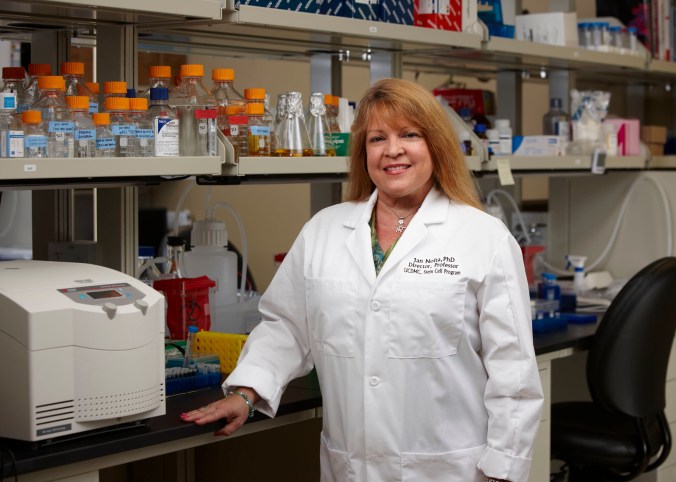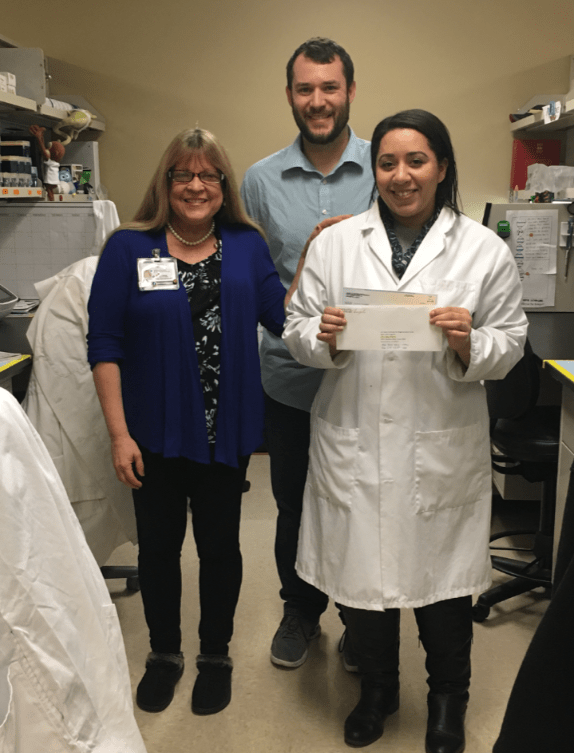
Dr. Jan Nolta (UC Davis Health)
Jan Nolta is a scientific rockstar. She is a Professor at UC Davis and the Director of the Stem Cell Program at the UC Davis School of Medicine. Her lab’s research is dedicated to developing stem cell-based treatments for Huntington’s disease (HD). Jan is a tireless advocate for both stem cell and HD research and you’ll often see her tweeting away about the latest discoveries in the field to her followers.
What I admire most about Dr. Nolta is her dedication to educating and mentoring young students. Dr. Nolta helped write the grant that funded the CIRM Bridges master’s program at Sacramento State in 2009. Over the years, she has mentored many Bridges students (we blogged about one student earlier this year) and also high school students participating in CIRM’s SPARK high school internship program. Many of her young trainees have been accepted to prestigious colleges and universities and gone on to pursue exciting careers in STEM.
I reached out to Dr. Nolta and asked her to share her thoughts on the importance of mentoring young scientists and supporting their career ambitions. Below is a summary of our conversation. I hope her passion and devotion will inspire you to think about how you can get involved with student mentorship in your own career.
Describe your career path from student to professor.
I was an undergraduate student at Sacramento State University. I was a nerdy student and did research on sharks. I was planning to pursue a medical degree, but my mentor, Dr. Laurel Heffernan, encouraged me to consider science. I was flabbergasted at the suggestion and asked, “people pay you to do this stuff??” I didn’t know that you could be paid to do lab research. My life changed that day.
I got my PhD at the University of Southern California. I studied stem cell gene therapy under Don Kohn, who was a fabulous mentor. After that, I worked in LA for 15 years and then went back home to UC Davis in 2007 to direct their Stem Cell Program.
It was shortly after I got to Davis that I reconnected with my first mentor, Dr. Heffernan, and we wrote the CIRM Bridges grant. Davis has a large shared translational lab with seven principle investigators including myself and many of the Bridges students work there. Being a scientist can be stressful with grant deadlines and securing funding. Mentoring students is the best part of the job for me.
Why is it important to fund educational programs like Bridges and SPARK?
There is a serious shortage of well-trained specialists in regenerative medicine in all areas of the workforce. The field of regenerative medicine is still relatively new and there aren’t enough people with the required skills to develop and manufacture stem cell treatments. The CIRM Bridges program is critical because it trains students who will fill those key manufacturing and lab manager jobs. Our Bridges program at Sacramento State is a two-year master’s program in stem cell research and lab management. They are trained at the UC Davis Good Manufacturing Practice (GMP) training facility and learn how to make induced pluripotent stem cells (iPSCs) and other stem cell products. There aren’t that many programs like ours in the country and all of our students get competitive job offers after they complete our program.
We are equally passionate about our high school SPARK program. It’s important to capture students’ interests early whether they want to be a scientist or not. It’s important they get exposed to science as early as possible and even if they aren’t going to be a scientist or healthcare professional, it’s important that they know what it’s about. It’s inspiring how many of these students stay in STEM (Science, Technology, Engineering and Math) because of this unique SPARK experience.

Jan Nolta with the 2016 UC Davis SPARK students.
Can you share a student success story?
I’m so proud of Ranya Odeh. She was a student in our 2016 SPARK program who worked in my lab. Ranya received a prestigious scholarship to Stanford largely due to her participation in the CIRM SPARK program. I got to watch her open the letter on Instagram, and it was a really incredible experience to share that part of her life.
I’m also very proud of our former Bridges student Jasmine Carter. She was a mentor to one of our SPARK students Yasmine this past summer. She was an excellent role model and her passion for teaching and research was an inspiration to all of us. Jasmine was hoping to get into graduate school at UC Davis this fall. She not only was accepted into the Neuroscience Graduate Program, but she also received a prestigious first year program fellowship!

UC Davis Professors Jan Nolta and Kyle Fink with CIRM Bridges student Jasmine Carter
[Side note: We’ve featured Ranya and Jasmine previously on the Stem Cellar and you can read about their experiences here and here.]
Why is mentoring important for young students?
I can definitely relate to the importance of having a mentor. I was raised by a single mom, and without scholarships and great mentors, there’s no way I would be where I am today. I’m always happy to help other students who think maybe they can’t do science because of money, or because they think that other people know more than they do or are better trained. Everybody who wants to work hard and has a passion for science deserves a chance to shine. I think these CIRM educational programs really help the students see that they can be what they dream they can be.
What are your favorite things about being a mentor?
Everyday our lab is full of students, science, laughter and fun. I love coming in to the lab. Our young people bring new ideas, energy and great spirit to our team. I think every team should have young trainees and high school kids working with them because they see things in a different way.
Do you have advice for mentoring young scientists?
You can sum it up in one word: Listen. Ask them right away what their dreams are, where do they imagine themselves in the future, and how can you help them get there. Encourage them to always ask questions and let them know that they aren’t bothering you when they do. I also let my students know that I’m happy to be helping them and that the experience is rewarding for me as well.
So many students are shy when they first start in the lab and don’t get all that they can out of the experience. I always tell my students of any age: what you really want to do is try in life. Follow your tennis ball. Like when a golden retriever sees a tennis ball going by, everything else becomes secondary and they follow that ball. You need to find what that tennis ball is for you and then just try to follow it.
What advice can you give to students who want to be scientific professors or researchers?
Find somebody who is a good mentor and cares about you. Don’t go into a lab where the Principle Investigator (PI) is not there most of the time. You will get a lot more out of the experience if you can get input from the PI.
A good mentor is more present in the lab and will take you to meetings and introduce you to people. I find that often students read papers from well-established scientists, and they think that their positions are unattainable. But if they can meet them in person at a conference or a lecture, they will realize that all of the established scientists are people too. I want young students to know that they can do it too and these careers are attainable for anybody.